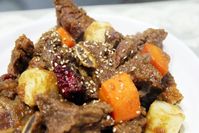1. Ingredients for Bossam
- Primary ingredients: Pork (greasy parts like pork belly and neck)
- Secondary ingredients: Spicy Kimchi seasoned with cabbages, radish, chili power, salted shrimp, garlic and ginger
2. Taste evaluation
-Spicy: ★★★☆☆
-Salty: ★★☆☆☆
-Sweet: ☆☆☆☆☆
-Sour: ☆☆☆☆☆
3. Introduction to Bossam(Napa cabbage wrap with steamed pork)
Bossam is boiled pork or beef head meat, pressed with a heavy object, and sliced into bite size pieces. But these days, pork meat is usually used for Bossam and you could eat it wrapped in spicy cabbage leaves.
Bossam is quite popular in Korea that you can easily find restaurant chains anywhere.
Bossam has something to do with Korean Kimchi. Every winter, Koreans make Kimchi for them to eat for the next whole year and this culture is called Gimjang.
In old days, every family used to make a few hundreds of cabbages, which is a big number.
It’s originated from a culture that Yangban’s let their servants kill a pig, boil it and eat it with Kimchi to compensate for their hard work on the same day they made Kimchi.
This tradition still remains so Korean families eat steamed pork on the day they make Kimchi in winter.
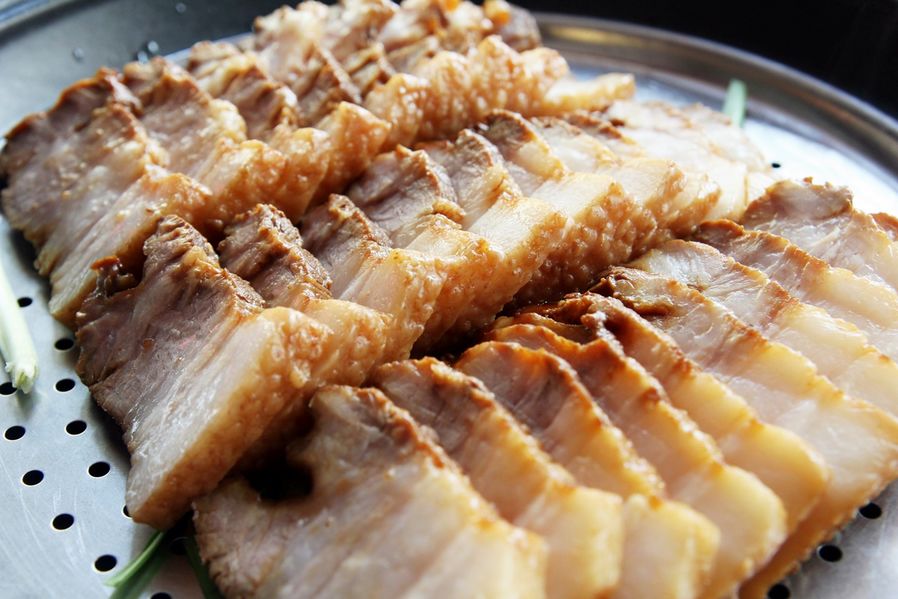
Canon EOS 550D | f/6.3 | iso 500 | 2013:03:08 16:46:09 | Flash did not fire, compulsory flash mode | 34mm
Bossam refers to something wrapped (Ssam) in a big piece of cloth (Bojagi).
So they named this cuisine Bossam because they eat pork wrapped with a big cabbage leaf.
Bossam is cooked by boiling greasy pork neck meat or pork belly meat in water for a long time. And Deonjang is added to water to salt it and ginger and garlic is used to remove the smell of the meat.
You could use medicinal herbs for better scent and healthier food according to your preferences.
Steamed meat is served with cabbage leaves that are just seasoned.
Normally regular Kimchi is used but originally, meat should be wrapped in Bossam Kimchi leaves.
Bossam Kimchi is made by putting spicy sauce including chili powder, sliced radish, salted shrimp, chestnut and jujube in a big cabbage leaf and rolling it.
And the way it looks exactly like Bossam and that’s why it’s called Bossam Kimchi.
Meat is wrapped in cabbage leaves while Kimchi also looks like Bossam, and that’s how Bossam was named.
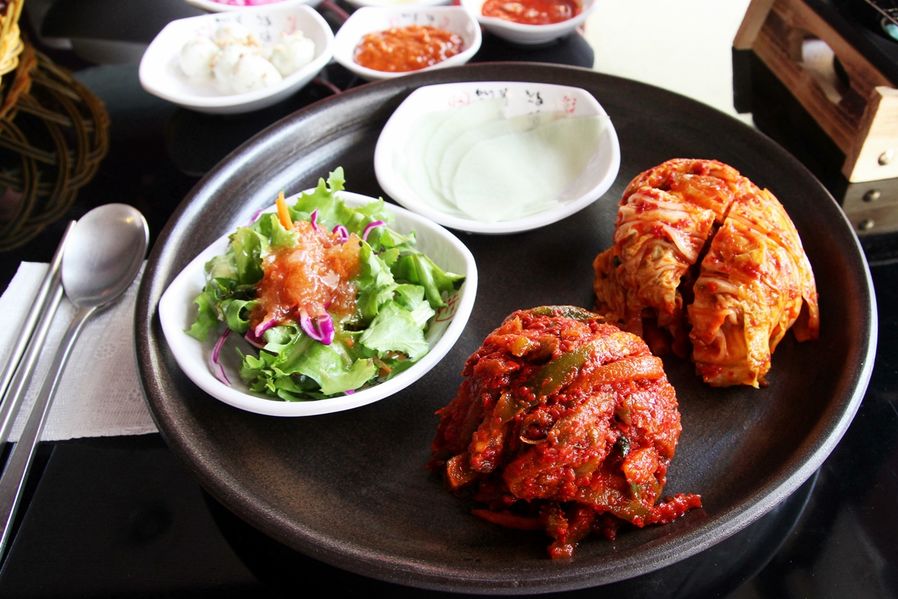
Canon EOS 550D | f/6.3 | iso 640 | 2013:03:08 16:46:32 | Flash did not fire, compulsory flash mode | 17mm
Pork gets so soft when you boil it for a long time.
Soft and greasy meat tastes amazing when you eat it with crunchy and spicy Bossam Kimchi.
Bossam is enjoyed by most of Korean people, especially when they drink alcohols.
So if you want to enjoy Korean traditional foods, Kimchi and Soju, I suggest you eat Bossam.
Search on Wikipedia
3. Kinds of Bossam
Bossam is steamed pork meat usually eaten with cabbage leaves wrapping it. You could use lettuce or perilla leaves, and use other ingredients such as medicinal herbs when you boil the meat.
I’ll introduce you three most popular Bossam.
* Pork Bossam: Steamed pork wrapped in Kimchi or other vegetables
* Jokbal Bossam: Pork trotters wrapped in Kimchi or other vegetables
* Gul Bossam: Steamed pork with raw oysters wrapped in Kimchi or other vegetables. There’s a Bossam street where you can eat Bossam with oysters on Jongro-3-ga Street
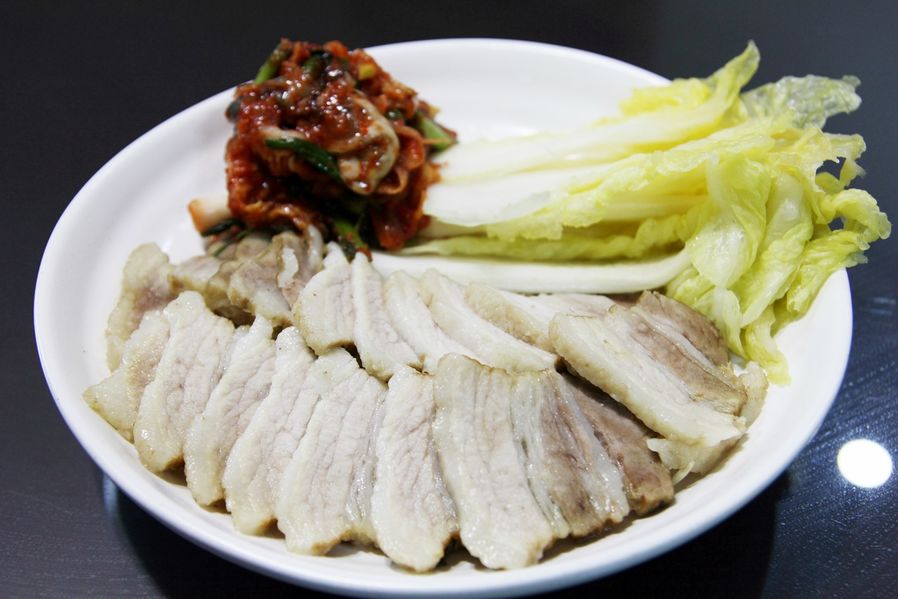
5. How to enjoy Bossam even more
When you order Bossam, steamed pork is served with vegetables, leaves (cabbage, perilla), raw garlics, Ssamjang(sauce) and salted shrimp.
Try the steamed meat first.
If it’s well cooked, you’ll taste salty Deonjang flavor and feel that greasy and soft taste of pork spreading on your tongue.
The meat itself should be very tasty.
Then try to wrap the meat with Kimchi.
Bossam Kimchi is less spicy and sweeter than regular Kimchi so it would be perfect for foreigners’ taste.
If you enjoyed Kimchi, try to add raw garlic or dip it in salted shrimp. Each one has different flavor so you’ll be able to experience different Bossam flavors.
Lastly, you should drink one small cup of Soju right after you eat a mouthful of Bossam.
Soju has neat aftertaste that cleans your mouth after greasy meat and spicy Kimchi.
When your mouth is cleaned, you would want another bite of Bossam. So…when your tongue is on fire, you should put it out with Soju, right?
That’s why Bossam is very nice dish to eat with alcoholic drinks.
Having drinks with your travel buddies having a dish of Bossam at the same table sounds like a good memory you can make in Korea.
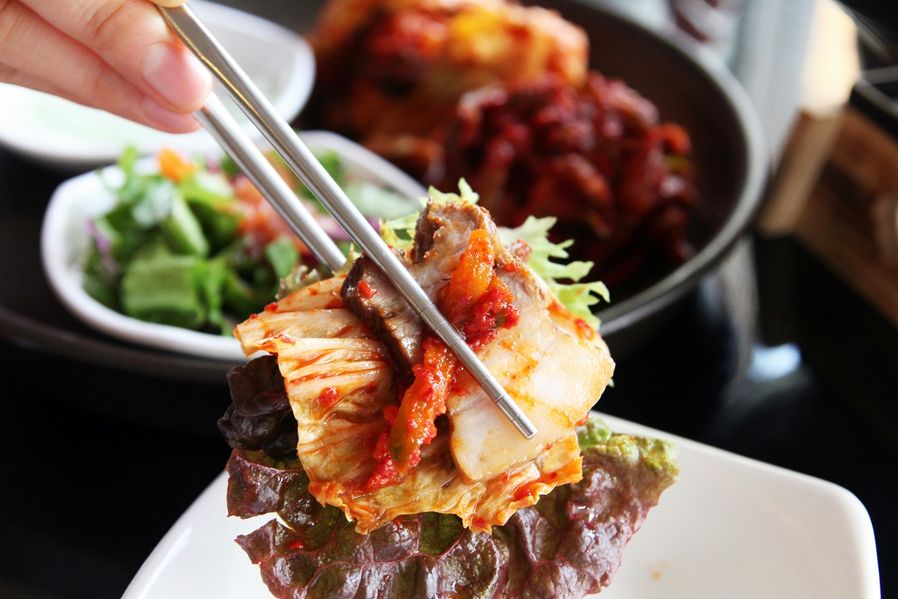
Canon EOS 550D | f/4.5 | iso 800 | 2013:03:08 16:52:42 | Flash did not fire, compulsory flash mode | 42mm









